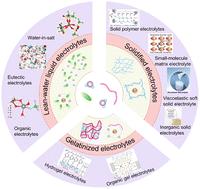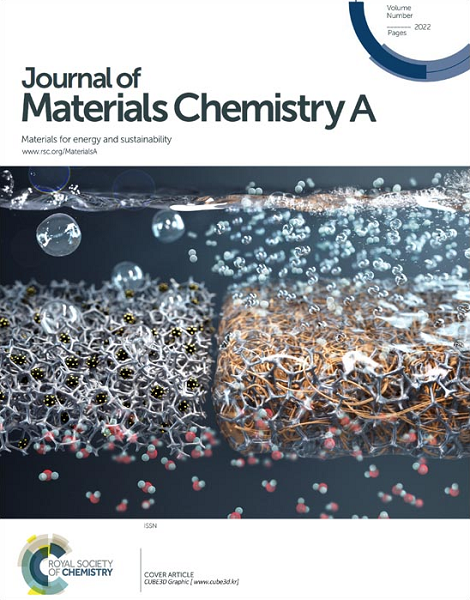非自由水主导的锌基电池电解质结构:走向可持续的长寿命锌基储能解决方案
IF 9.5
2区 材料科学
Q1 CHEMISTRY, PHYSICAL
引用次数: 0
摘要
基于锌(Zn)的储能系统由于其固有的安全性、环境友好性、成本效益等优点,作为电网规模储能的有希望的候选者受到了极大的关注。然而,在常见的水电解质中,锌金属阳极上寄生副反应的持续挑战继续阻碍实际实施。本文重点介绍了以非自由水为主导的电解质结构,主要包括稀水液体电解质、糊化电解质和固化电解质,从液体到固体体系的范式转换电解质工程策略的最新研究进展。首先全面概述了常见的纯水电解质的主要电化学挑战。随后,深入探讨了具有不同水分调节的电解质结构设计策略的进展,并详细讨论了包括半电池和全电池在内的相应电池的电化学性能。最后,我们研究了开发具有优化电化学性能的实用电解质的未来挑战。本文综述为下一代商用锌基储能系统的电解质设计提供了新的视角。本文章由计算机程序翻译,如有差异,请以英文原文为准。

Non-free water dominated electrolyte architectures for zinc-based batteries: toward sustainable long-life zinc-based energy storage solutions
Zinc (Zn)-based energy storage systems have garnered significant attention as promising candidates for grid-scale energy storage due to their inherent safety, environmental benignity, cost-effectiveness and so on. However, the persistent challenge of parasitic side reactions on the Zn metal anode in common aqueous electrolytes continues to impede practical implementation. This topical review highlights the latest research progress in paradigm-shifting electrolyte engineering strategies evolving from liquid to solid systems based on non-free water dominated electrolyte architectures, mainly including lean-water liquid electrolytes, gelatinized electrolytes, and solidified electrolytes. A comprehensive overview of the major electrochemical challenges of common pure aqueous electrolytes is firstly provided. Subsequently, the advancements in structural design strategies for electrolyte architectures with diverse water regulation are explored in depth, along with a detailed discussion of the corresponding electrochemical performance of cells including half and full cells. Finally, we examine the future challenges in developing practical electrolytes with optimized electrochemical properties. This review provides a fresh perspective on designing electrolytes for application in next-generation commercial Zn-based energy storage systems.
求助全文
通过发布文献求助,成功后即可免费获取论文全文。
去求助
来源期刊

Journal of Materials Chemistry A
CHEMISTRY, PHYSICAL-ENERGY & FUELS
CiteScore
19.50
自引率
5.00%
发文量
1892
审稿时长
1.5 months
期刊介绍:
The Journal of Materials Chemistry A, B & C covers a wide range of high-quality studies in the field of materials chemistry, with each section focusing on specific applications of the materials studied. Journal of Materials Chemistry A emphasizes applications in energy and sustainability, including topics such as artificial photosynthesis, batteries, and fuel cells. Journal of Materials Chemistry B focuses on applications in biology and medicine, while Journal of Materials Chemistry C covers applications in optical, magnetic, and electronic devices. Example topic areas within the scope of Journal of Materials Chemistry A include catalysis, green/sustainable materials, sensors, and water treatment, among others.
 求助内容:
求助内容: 应助结果提醒方式:
应助结果提醒方式:


